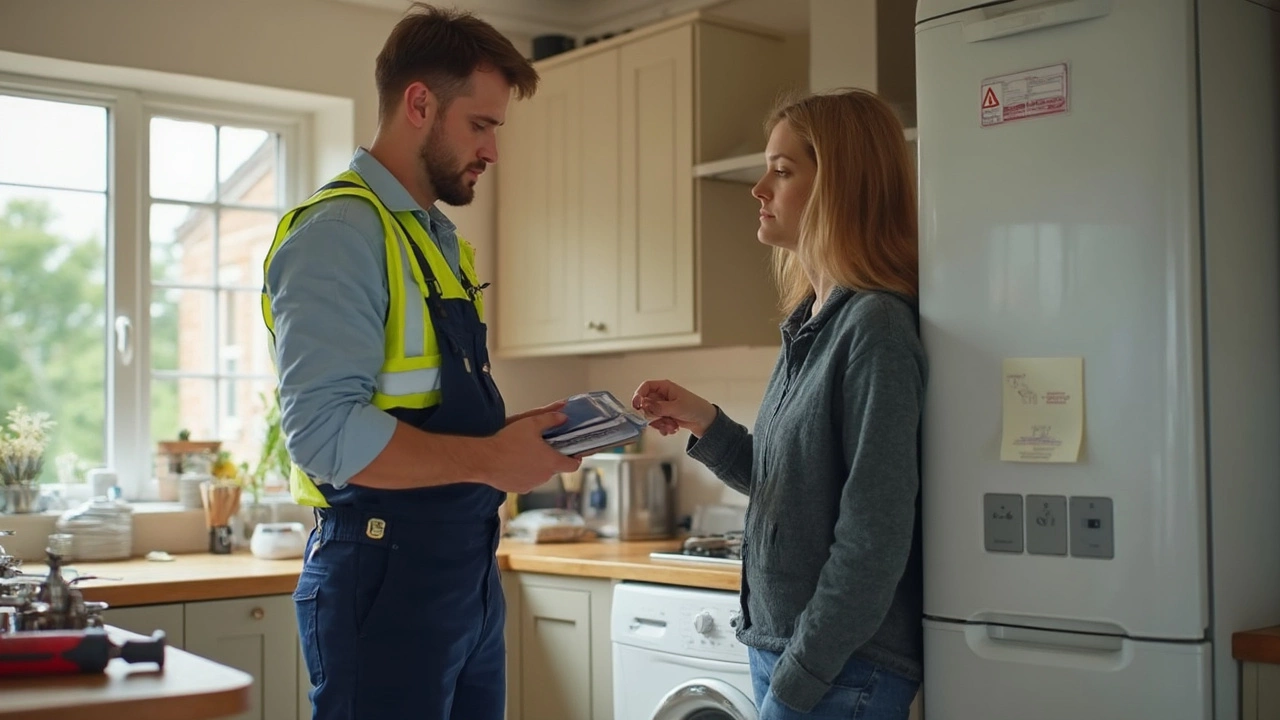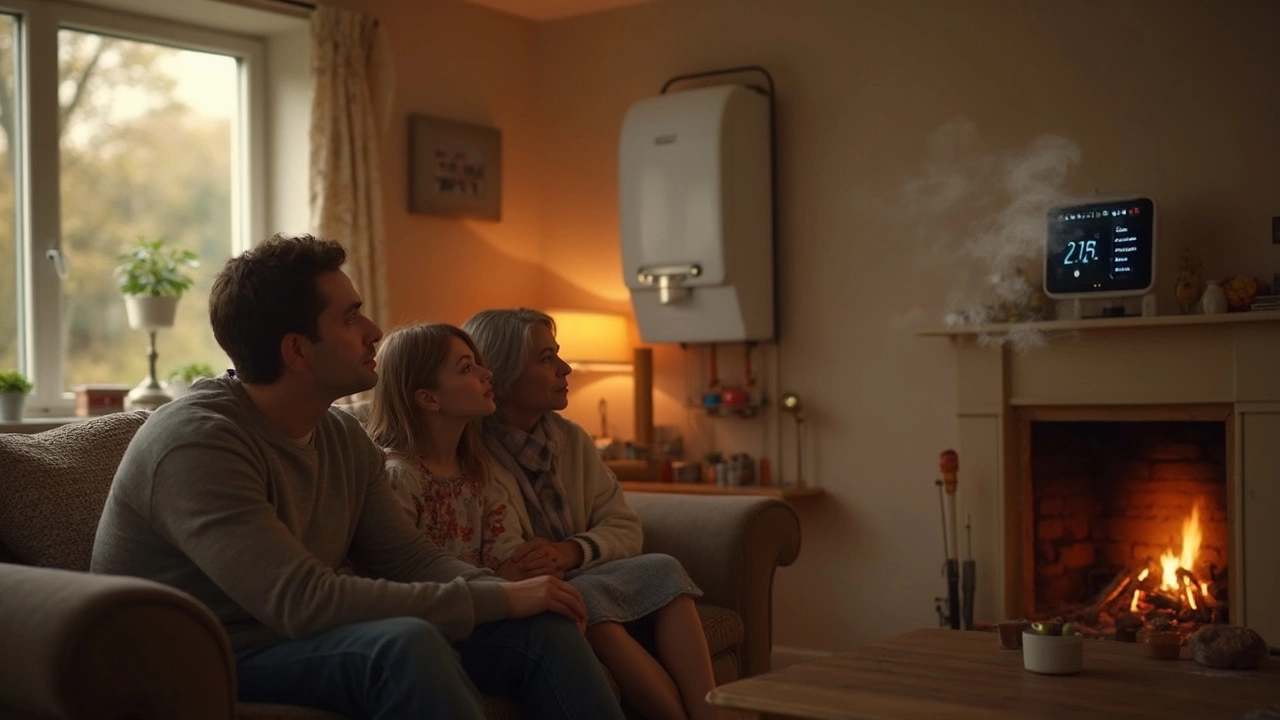Boilers aren’t exactly top of mind—until your shower turns freezing or the radiators quit just as winter bites. Most people ignore their boiler, hoping for the best, but that can backfire fast. A dodgy boiler is more than just annoying; it can cost you, leave you freezing, or even become unsafe if you ignore the warning signs.
If your radiators knock like someone’s stuck inside, or if the boiler takes forever to heat up, those aren’t just quirks—they’re cries for help. Odd smells, leaks, or weird noises usually mean something’s gone sideways. And if you ever see a pilot light that’s yellow (not blue), don’t mess around—turn the thing off and call for help. Gas leaks or carbon monoxide aren’t worth the risk.
The key? Don’t wait for a total breakdown. Catching trouble early is what saves you money, and honestly, a lot of stress. Plenty of boiler problems give you a clear heads-up once you know what to look for. So, how do you know when to worry? Stick around, and I’ll break it down so you don’t need to play guessing games with your heating.
- How Do Boilers Actually Work?
- The Early Warning Signs: What to Watch For
- What Counts as a Boiler Emergency?
- DIY Checks Before Calling a Pro
- Keeping Your Boiler Happy: Simple Maintenance Tips
How Do Boilers Actually Work?
Boilers might sound mysterious, but they’re really just workhorses built to heat water and send it where you need it: radiators, taps, or showers. Most home boilers in the UK are either combi boilers (that heat water on demand) or system/regular boilers that use hot water cylinders. They all have the same basic job—use gas or electricity to get water hot, then circulate that heat around your house.
Here’s how a typical boiler works, step-by-step:
- You set your thermostat and the boiler kicks on.
- The boiler heats water using a burner or heating element.
- Hot water or steam is pushed through pipes to your radiators or floor heating.
- Cooler water returns to the boiler to get reheated, and the cycle keeps going until your home is snug.
Modern boilers are pretty efficient. According to the UK’s Energy Saving Trust, a new condensing boiler can be up to 90% efficient, which means very little energy is wasted compared to old models that can drop below 60%. That’s money and heat saved right there.
Why does all this matter for boiler repair? If any part of this process fails—like the pump, the thermostat, or the burner—suddenly your system doesn’t work right. Spotting what’s gone wrong gets a lot clearer when you know what your boiler is supposed to do.
| Type | How It Heats | Hot Water Storage? |
|---|---|---|
| Combi Boiler | On demand | No |
| System/Regular Boiler | Stored hot water | Yes (Cylinder) |
| Condensing Boiler | Recycles exhaust heat | Depends on model |
If your radiators are cold, taps run lukewarm, or the boiler keeps cycling on and off, now you’ll know where to start looking. Simple breakdowns often come down to something in this chain getting stuck—or giving up completely. If the basics start making sense, figuring out what’s gone wrong gets way less frustrating.
The Early Warning Signs: What to Watch For
Most folks wait until their boiler repair bill explodes before paying attention, but your boiler usually drops hints long before it gives up for good. Noticing these early can save you money, nerves, and a lot of cold nights.
Here’s what should put you on alert:
- Strange noises: Banging, whistling (often called 'kettling'), or gurgling are classic trouble signs. This can mean lime scale buildup, trapped air, or a failing pump.
- Leaks or drips: Puddles or even minor drips are not normal. Left unchecked, leaks can corrode internal parts and lead to mold issues.
- Pilot light problems: If the flame keeps going out, or if it changes color (especially to yellow), there’s a safety issue. Usually, the flame should be blue—yellow hints at carbon monoxide risks.
- Uneven heating: If some rooms roast and others freeze, it’s a clue your boiler or radiators aren’t working right. Air or sludge in the system can mess with flow.
- Pressure drops: If you keep topping up your boiler pressure, something is leaking or broken inside. It’s a sign you can’t ignore for long.
- Odd smells: Any unusual stink—especially a burning smell or one a bit like rotten eggs—means there could be an electrical or gas problem. Open windows and call a pro right away if you smell gas.
For anyone who loves seeing the numbers, check out these common warning signs and how often boiler engineers say they lead to bigger problems:
| Warning Sign | % Leading to Major Repairs |
|---|---|
| Banging/kettling noise | 68% |
| Pilot light keeps going out | 75% |
| Small leak/drip noticed | 60% |
| Odd or burning smells | 84% |
| Pressure drops repeatedly | 72% |
You don’t have to be an engineer to spot most of these. Listen, look, and trust your gut—if your boiler seems off, it probably is. Tackling small problems before they snowball is the key to keeping your home warm and your wallet from hurting.

What Counts as a Boiler Emergency?
Not every flickering light or minor rattle means you’re in crisis mode, but some issues? They’re a hard stop. When it comes to boiler repair, knowing what counts as a true emergency could save you from major damage (or worse).
Here’s what you should never ignore:
- Gas smell or suspected gas leak: If you sniff rotten eggs or something like sulfur, get everyone out fast and call emergency services. Don’t try to fix or investigate.
- Yellow or orange pilot light (instead of blue): This can signal carbon monoxide—an invisible, deadly gas. Turn off your boiler and get help immediately.
- Major water leaks: P puddle under the boiler, or water coming down the wall? Shut off your water and power to the boiler, then call a pro. Water can wreck your home or electrics faster than you think.
- No heating or hot water in winter: Especially for families with kids, older folks, or anyone vulnerable, no heat is more than uncomfortable—it’s unsafe. Don’t tough it out; get someone in today.
- Strange loud noises: A bit of whirring is normal, but banging, clanging, or screeching could mean parts are failing or pressure is building up.
If you see warning lights flashing on modern digital boilers, check your manual. Some codes point to stuff you can handle, but any sign of overheating or high pressure needs immediate action. Never ignore smoke, burning smells, or scorched wires either—those mean you should get out and call the fire brigade.
When in doubt, play it safe. True emergencies are rare, but catching them early means keeping your home (and everyone in it) safe.
DIY Checks Before Calling a Pro
Sometimes your boiler acts up, but you don’t need to panic or book an emergency fix right away. There are a few simple checks you can do yourself to rule out the quick stuff—no special tools or gear needed. Here’s how you can save time (and maybe a bit of cash) before calling for boiler repair.
- Check the thermostat: This sounds obvious, but double-check your thermostat’s settings. Kids, pets, or just brushing past can knock it lower accidentally.
- Inspect boiler pressure: Most boilers work best with pressure between 1 and 2 bars. If it’s too low (common after bleeding radiators), look up your manual on topping it up—usually just a twist of a valve.
- Look for error codes: Modern boilers flash error codes on the display. Jot down the code, then look it up in your manual or online. Sometimes, it's as simple as resetting the boiler.
- Bleed your radiators: If your home feels cold even though the boiler is on, tricky air pockets might be the reason. Grab a radiator key, let out trapped air, and see if the warmth improves.
- Power supply check: Make sure the boiler’s getting power. Tripped circuit breakers or a blown fuse can be a sneaky cause.
- Check timer/programmer: Maybe it’s set wrong, the clock changed, or the battery’s dead. Reset or replace if needed.
A few things are NOT safe for DIY. Smelling gas? Noticing leaks or soot? Switch off the power, turn off the gas at the main valve, get outside, and call in help. Messing with gas or electrics when you don’t know what you’re doing isn’t worth the risk.
| Problem | DIY Step | Call a Pro? |
|---|---|---|
| No heat/hot water | Check thermostat, boiler pressure, power | Only if these don’t solve it |
| Strange noises | Bleed radiators | If noise still there |
| Error code shows | Reset, check manual | If code stays after reset |
| Boiler leaks | Turn off and call pro | Yes, immediately |
| Smell gas | Turn off, open windows, call pro | Yes, emergency |
Handle the basics first and don’t overthink it. If your quick checks don’t fix the problem, or things get weird (like water where it shouldn’t be, or a repeated error code), time to ring up someone certified. And remember, don’t try to fix gas or electric issues yourself—leave that stuff to the pros.

Keeping Your Boiler Happy: Simple Maintenance Tips
You don’t need to be a heating engineer to help your boiler outlast the winter. A little routine care makes a big difference, and some checks take just minutes. Here’s how you can avoid costly boiler repair and keep the hot water flowing.
- Boiler repair pros agree—an annual professional service is non-negotiable. Even if your boiler seems fine, a yearly check catches hidden issues, cleans out grime, and keeps your warranty valid. Most local engineers get busiest in autumn, so book ahead if you can.
- Bleed your radiators at least once a year. If some rooms are cold at the top and hot at the bottom, air is trapped inside. Use a bleed key (cheap online or at hardware shops) and a rag. Just turn the key a little until you hear a hiss, then close it once water comes out. Less air, more heat.
- Check the pressure gauge on your boiler every month or so. Most systems like the needle between 1 and 1.5 bar when cool. Too low and your heating gets patchy; too high risks leaks. Topping up with the filling loop is easy—just follow your manual.
- Keep vents and flues clear. Stuff blocking vents or outdoor pipes causes dangerous fumes or shutdowns. Every few weeks, do a quick look-around for nests, rubbish, or snow buildup (yep, birds and winter storms can both cause trouble).
- Pay attention to error codes on digital displays. If you see one, note it down. Your boiler handbook or the brand’s website can tell you what’s up—and it saves guesswork if you ever need to call somebody.
A good habit is to run your boiler for a few minutes each week, even in summer. This keeps parts from seizing and prevents more headaches when cold weather hits. Small fixes now mean less drama when you really need your heat.
